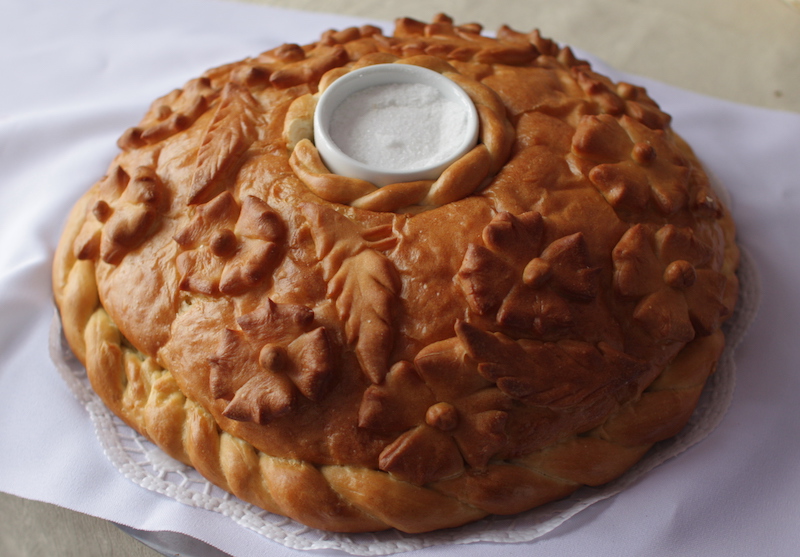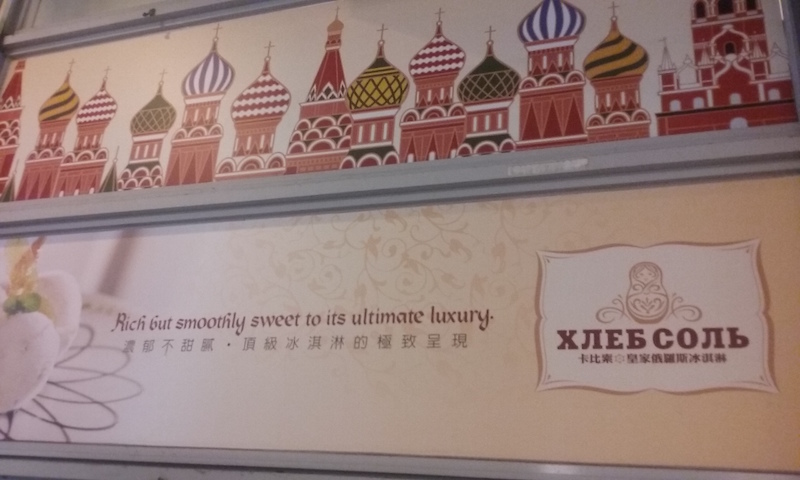Bread-salt ice cream
« previous post | next post »
AntC took this photograph today at the "Sun Moon Lake" Visitor Centre / main bus station in Taiwan:
Such a surfeit of superlatives!
nóngyù bù tiánnì, dǐngjí bīngqílín de jízhì chéngxiàn
濃郁不甜膩, 頂級冰淇淋的極致呈現
rich but not cloying, presenting the ultimate in the finest ice cream
If it weren't for this perfect English word, "cloying", one would be hard put to know what to do with the negation of tiánnì 甜膩, which is often translated as "sweet; very sweet", in this context of extolling the virtues of ice cream. Literally, the two morphemes that make up the word tiánnì 甜膩 mean "sweet" and "fatty; oily; unctuous". The expression tiánnì 甜膩 often appears in the form 甜膩膩, with the second syllable reduplicated. In this case, it is usually translated as "very sweet", and I would even render it as "saccharine; excessively sweet".
Still more arresting than the gushing Chinese is the Russian name of the ice cream: khleb sol' ХЛЕБ СОЛЬ. I know enough Russian to realize at once that ХЛЕБ СОЛЬ means "bread-salt" or "bread and salt". At first this struck me as a funny way to refer to the ultimate ice cream experience. Digging into it a bit deeper, though, I find that khleb sol' ХЛЕБ СОЛЬ ("bread-salt; bread and salt") was used in a welcome greeting ceremony in Russia. Here is a nice description of it:
The “Bread and Salt” is a form of specially baked round bread with a salt shaker placed on top of the bread. You can find this custom being practiced during official events and even in restaurants when you go with a group of tourists.
Usually the “Bread and Salt” on a round tray is covered with an embroidered towel and is presented by a young woman dressed in a national costume (e.g., “sarafan” with “kokoshnik”).
If you are presented with a “Bread and Salt”, you should help yourself for sure: you need to break off a piece of bread, dip it in salt and eat it with a smile. You should not refuse, or the host would get greatly offended.
The "bread and salt" ceremony is found not just in Russia, but in many other European cultures, as explained in this Wikipedia article:

The tradition, known by its local Slavic names: Belarusian: Хлеб і соль; Bulgarian: Хляб и сол; Macedonian: Леб и сол; Croatian: Kruh i sol; Serbian: Хлеб и со; Polish: Chleb i Sól; Slovak: Chlieb a soľ; Czech: Chléb a sůl; Slovene: Kruh in sol; Russian: Хлеб-соль, Ukrainian: Хліб і сіль was also adopted by three non-Slavic nations — Lithuanians, Latvians (both Baltic) and Romanians (Latin) — all three of which are culturally and historically close to their Slavic neighbours (Lithuanian: Duona ir druska. Latvian: Sālsmaize and Romanian: Pâine și sare). It is also common in Armenia (Armenian: աղ ու հաց, agh u hats).
When important, respected, or admired guests arrive, they are presented with a loaf of bread placed on a rushnik (embroidered towel). A salt holder or a salt cellar is placed on top of the bread loaf or secured in a hole on the top of the loaf. In modern Russia, on official occasions, the "bread and salt" is presented by young women dressed in national costumes (e.g., sarafan and kokoshnik).
When this tradition is observed in spaceflight, appropriately small packages of bread and salt are used.
A derivative of khleb sol' ХЛЕБ СОЛЬ ("bread-salt; bread and salt") is "khlebosolny" (something like "bread-and-salty"), which came to signify hospitality.
Arina Mikhalevskaya notes:
I see on the Internet that "ХЛЕБ СОЛЬ" may still be used sometimes as a name for restaurants serving traditional Russian cuisine or bakery cafes in Russia (probably more often as a name for bakery cafes than for anything else), but it looks a bit odd to me as the name of an ice cream cafe.
I suppose the choice of this name for their ice cream brand is a reflection of the increasing numbers of Russian tourists who are coming to the island nation. I certainly see a lot more Russian in Israel where I am now than I did on trips here five or more years ago.
[Thanks to Rostislav Berezkin and Fangyi Cheng]

Jenny Chu said,
December 22, 2016 @ 8:37 pm
Surfeits of superlatives are very common in the world of consumer public relations in both Hong Kong and Taiwan.
I remember a client asking me to make a press release more "exciting" and "crispy", and to let me know what she meant, she suggested I use phrases such as "the ultimate flavor sensation", "the most delicious experience", and "the most amazing new tastes ever". The product was a mass produced fast food pie.
Broadbean said,
December 23, 2016 @ 5:26 am
There has been a ХЛЕБ СОЛЬ branch in Taipei since at least 2009 – just off Yongkang Jie.
Amy Stoller said,
December 23, 2016 @ 8:02 am
Bread and salt are the common constants in traditional housewarming gifts in the US, obviously brought with families from the Old Country, generally a European Old Country. They may accompanied by sugar or honey, wine, a broom, or other things, depending on the specific Old Country, or perhaps religious tradition.
You can find the wine version It’s a Wonderful Life:
Bread so that this house may never know hunger
Salt so that life may always have flavor
Wine that joy and prosperity may reign forever
S.P.Zeidler said,
December 23, 2016 @ 9:52 am
try "ancient Greece" too.
If you shared bread and salt with someone you were strictly bound to peace with them for a day and a night. A host would offer it when you arrived in order to tell you that you would be safe in their house, and the guest would accept it to say they'd not do harm to their host, and breaking that assurance called the Erinnyes onto the offender.
D.O. said,
December 23, 2016 @ 11:07 pm
You forgot to mention (maybe because it is obvious) that the background image is of inordinate number of onion domes guarded by 3 Kremlin towers, as if all the domes of the nearby Intercession Cathedral were chopped off, multiplied and thrown behind the Kremlin wall.
Max said,
December 24, 2016 @ 2:28 am
Anyone know the origin of Croatian and Slovene kruh, which seem to be the odd ones out in Slavic words for bread? Hleb is from Germanic (proto-Germanic *hlaibaz, English loaf, German Laib).
AntC said,
December 24, 2016 @ 5:25 am
Thank you Victor for another comprehensive explanation.
And thank you @Broadbean for the local knowledge. But I think I won't be visiting ХЛЕБ СОЛЬ . The flagship product (on a second panel of the same advert) is "Cheese with Rose Salted Caramel". Sounds impossibly "cloying" — yes, just the word for Taiwan desserts generally. (And I've never understood the fad for salted caramel.)
@D.O. yes it was the onion domes as well as the Babushka that drew my attention. They were such a surprise in Taiwan.
Jamie said,
December 24, 2016 @ 11:58 pm
@Max: the Online Etymological Dictionary mentions this, in the entry on "bread":
But OED argues at some length for the basic sense being not "cooked food" but "piece of food," and the Old English word deriving from a Proto-Germanic *braudsmon- "fragments, bits" (cognate with Old High German brosma "crumb," Old English breotan "to break in pieces") and being related to the root of break (v.). It cites Slovenian kruh "bread," literally "a piece."
http://etymonline.com/index.php?term=bread
BZ said,
December 27, 2016 @ 12:43 pm
I don't doubt the history you presented (though I've never heard of it before), but it's important to mention that today "ХЛЕБ СОЛЬ" or more fully "ХЛЕБ ДА СОЛЬ" ("bread and salt") means something similar to the English "bread and butter", the minimum food required to live, but also "all the food you need" (there are figurative non-food extensions of this as well). As such, it is a perfect name for a company that makes any sort of food, including ice cream.
As an aside, I find this notion somewhat funny because you don't really need either bread or salt to live. For example, I'm on a bread-free diet as I'm writing this, though my Russianness might be stopping me from going low sodium as well.
Chaon said,
December 28, 2016 @ 3:39 am
That is not a Taiwanese brand of ice cream. It is imported from Russia.
Wonks Anonymous said,
December 29, 2016 @ 12:51 pm
The bread & salt tradition was incorporated into George R. R. Martin's society of "Westeros". Although based on that list of countries, it seems more of an eastern european tradition.